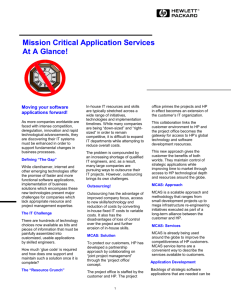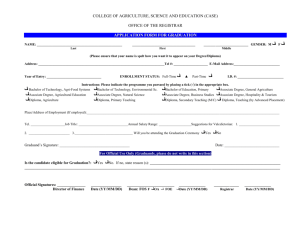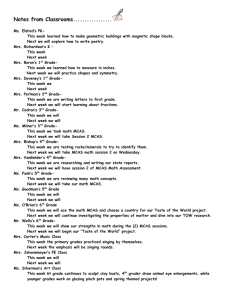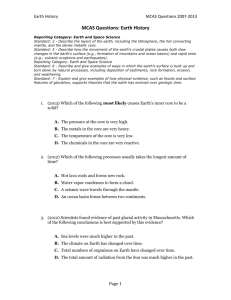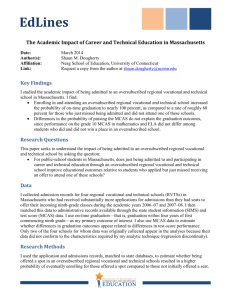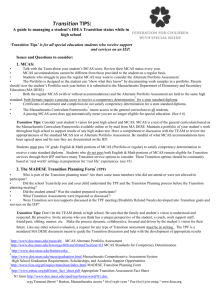turning 22 or graduating - Federation for Children with Special Needs
advertisement
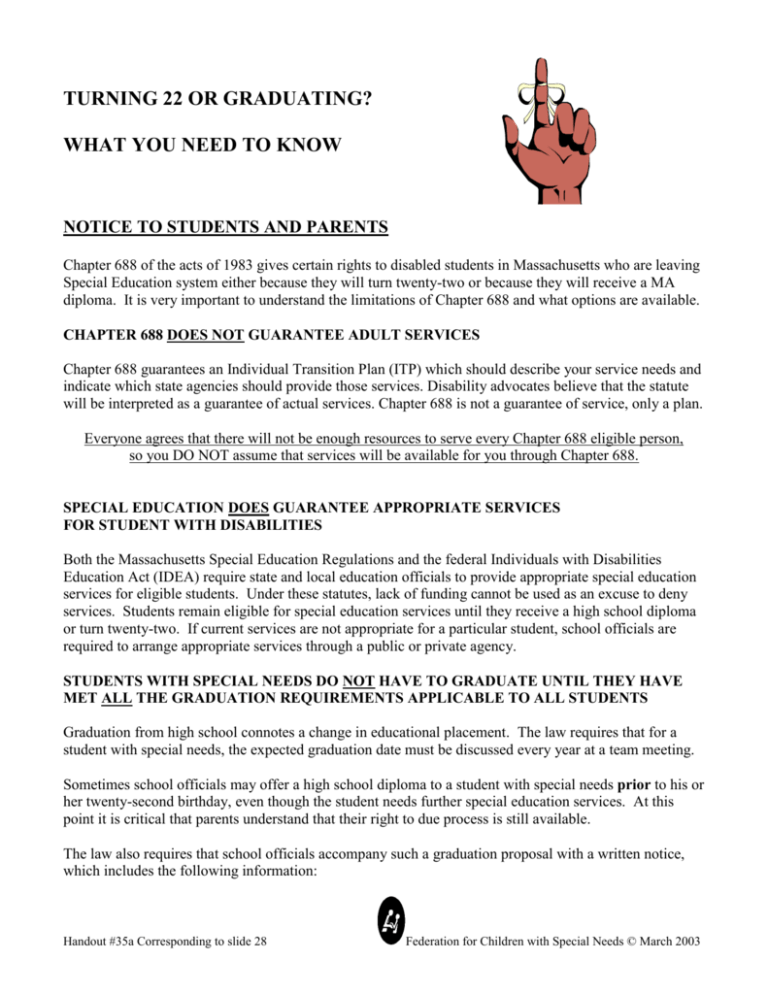
TURNING 22 OR GRADUATING? WHAT YOU NEED TO KNOW NOTICE TO STUDENTS AND PARENTS Chapter 688 of the acts of 1983 gives certain rights to disabled students in Massachusetts who are leaving Special Education system either because they will turn twenty-two or because they will receive a MA diploma. It is very important to understand the limitations of Chapter 688 and what options are available. CHAPTER 688 DOES NOT GUARANTEE ADULT SERVICES Chapter 688 guarantees an Individual Transition Plan (ITP) which should describe your service needs and indicate which state agencies should provide those services. Disability advocates believe that the statute will be interpreted as a guarantee of actual services. Chapter 688 is not a guarantee of service, only a plan. Everyone agrees that there will not be enough resources to serve every Chapter 688 eligible person, so you DO NOT assume that services will be available for you through Chapter 688. SPECIAL EDUCATION DOES GUARANTEE APPROPRIATE SERVICES FOR STUDENT WITH DISABILITIES Both the Massachusetts Special Education Regulations and the federal Individuals with Disabilities Education Act (IDEA) require state and local education officials to provide appropriate special education services for eligible students. Under these statutes, lack of funding cannot be used as an excuse to deny services. Students remain eligible for special education services until they receive a high school diploma or turn twenty-two. If current services are not appropriate for a particular student, school officials are required to arrange appropriate services through a public or private agency. STUDENTS WITH SPECIAL NEEDS DO NOT HAVE TO GRADUATE UNTIL THEY HAVE MET ALL THE GRADUATION REQUIREMENTS APPLICABLE TO ALL STUDENTS Graduation from high school connotes a change in educational placement. The law requires that for a student with special needs, the expected graduation date must be discussed every year at a team meeting. Sometimes school officials may offer a high school diploma to a student with special needs prior to his or her twenty-second birthday, even though the student needs further special education services. At this point it is critical that parents understand that their right to due process is still available. The law also requires that school officials accompany such a graduation proposal with a written notice, which includes the following information: Handout #35a Corresponding to slide 28 Federation for Children with Special Needs © March 2003 1. A statement that graduation from high school with a state certified diploma terminates special education eligibility. 2. An explanation about why the school believes the student should graduate, including MCAS scores and a description of any tests or records used as a basis for the recommendation. 3. A description of what options the school has considered, including other programs, which could not be provided through the special education system, and why those options were rejected. 4. A full explanation of the procedural rights including due process procedures available and a” summary of performance”. 5. Other factors relevant to the graduation recommendation, including any alternative services that may be available from adult service agencies. MCAS and GRADUATION The law requires that all secondary students participate in the Massachusetts Comprehensive Assessment System (MCAS). Starting with the high school graduating class of 2003, students who pass the grade 10 English and Mathematics MCAS tests with a performance at the level of 220 or better, using “standard” or “non-standard” accommodations will earn a competency determination. Remember that federal law guarantees your child access to the general education curriculum which is academic curriculum covered by MCAS. Because your child’s IEP must ensure that he or she has the chance to learn this information, the accommodations provided for MCAS should be the same as those provided as part of the student’s routine classroom instruction. For youngsters who cannot take MCAS on demand or with special accommodations, the MCAS alternate portfolio may be an appropriate option. As noted previously, under the special education law, a student with a disability who requires special education is entitled to receive a publicly funded special education until s/he turns twenty-two or "attains a high school diploma or its equivalent," whichever comes first. A student who passes MCAS, but has not met local graduation requirements is still eligible for SPED services. Students who wish to challenge the competency requirement should not accept an IEP that proposes graduation until they have had sufficient professional advice and affirmatively decided that they wish to terminate their special education eligibility. The state-endorsed ‘certificate’ is not equivalent to a high school diploma. It is also important to note that a student who receives a certificate other than a diploma or GED will NOT be eligible for: financial aid, military service, or entry into a majority of credentialed postsecondary program choices. Handout #35a Corresponding to slide 28 Federation for Children with Special Needs © March 2003

